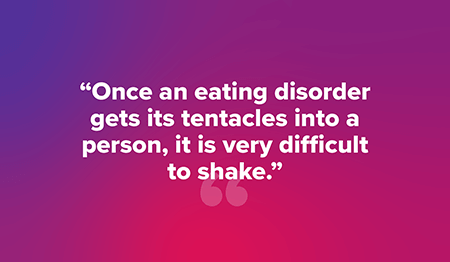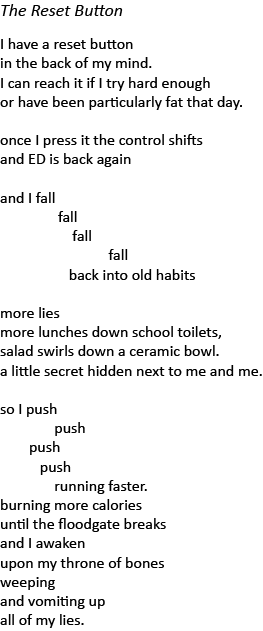February 23, 2021
By Julie Fulkerson

Around age twelve or thirteen, just as she was entering adolescence, my daughter Michelle started struggling with anorexia, anxiety and depression. The first symptoms I remember noticing seemed to be triggered by switching to a new Junior High. Michelle had a difficult time adjusting and making friends at her new school, began showing signs of depression, and out of nowhere she started having panic attacks. I found a therapist for her, and at first it seemed to help.
Physically, Michelle had always been very slender and petite, partly a result of her very premature birth at just 23 weeks gestation. As she moved into adolescence, her body was slow to develop. While other girls her age were developing breasts, hips and curves, Michelle’s body remained very slender and almost child-like. I didn’t think much of it at the time, because she had always been on the small side and I, myself, had been a late bloomer. However, it was a harbinger of the battle that was forming in Michelle’s mind. She would later tell me that she was freaked out by her changing body, and didn’t want to gain weight.
In the fall of her freshman year of high school, Michelle made a startling revelation: she was struggling with an eating disorder and needed help. I took her to a therapist who listed eating disorders as among her areas of expertise, and after talking with Michelle and I, both together and separately, she determined that Michelle was suffering from Anorexia. She sent us to the Eating Recovery Center in Plano, Texas for a formal Assessment, which confirmed the diagnosis of anorexia. My head was spinning: how was this possible? How could my daughter be starving herself right under my nose? I was overwhelmed by guilt and felt like a failure as a parent.
Michelle entered a residential treatment program, and our family threw ourselves into supporting her recovery process. After 4 months of treatment, Michelle returned to school while continuing in an outpatient treatment program. We were hopeful. However, once an eating disorder gets its tentacles into a person, it is very difficult to shake. Relapse is a common reality, as illustrated by this poem written by Michelle:

Michelle went through a couple more rounds of treatment and took part in follow-up treatment with therapists and nutritionists, eventually beating the anorexia. It was a beautiful thing to see her once skeletal frame and hollow cheeks fill in, to see her be able to enjoy food, to shop for clothes without feeling fat or having an anxiety attack.
The devil that wasn’t so easy to defeat (despite intensive outpatient programs, working with various therapists, and trying numerous medications) was the underlying severe depression and anxiety. In July 2019, four months shy of her 18th birthday, Michelle took her own life. In the months following Michelle’s death, I have wrestled not only with the grief and loss, but also with the guilt and remorse that I’m sure every parent who has ever lost a child to suicide goes through. One thing that became clear to me along the way is that I want to bring something good out of Michelle’s life and her struggles.
Michelle was a gifted writer and enjoyed the power of words to express and evoke emotions. She began writing poetry and short-stories at age 12, and also kept a journal on and off where she wrote with poignant honesty regarding her mental health struggles. After her death, I discovered that she had started compiling her poems into a book, which she titled, “Through Adversity to the Stars.” I have completed the book she started, searching through her journals and her computer for additional poems, reflections and short stories. I hope to publish her book, to share her voice with the world, in the hope that it will give hope to others who are struggling with eating disorders and other mental health issues. I believe that this project is also an important part of my own healing process.
Michelle's book is now available for purchase here.
We’re always accepting submissions to the NAMI Blog! We feature the latest research, stories of recovery, ways to end stigma and strategies for living well with mental illness. Most importantly: We feature your voices.
LEARN MORENAMI HelpLine is available M-F, 10 a.m. – 10 p.m. ET. Call 800-950-6264,
text “NAMI” to 62640, or email. In a crisis, call or text 988 (24/7).